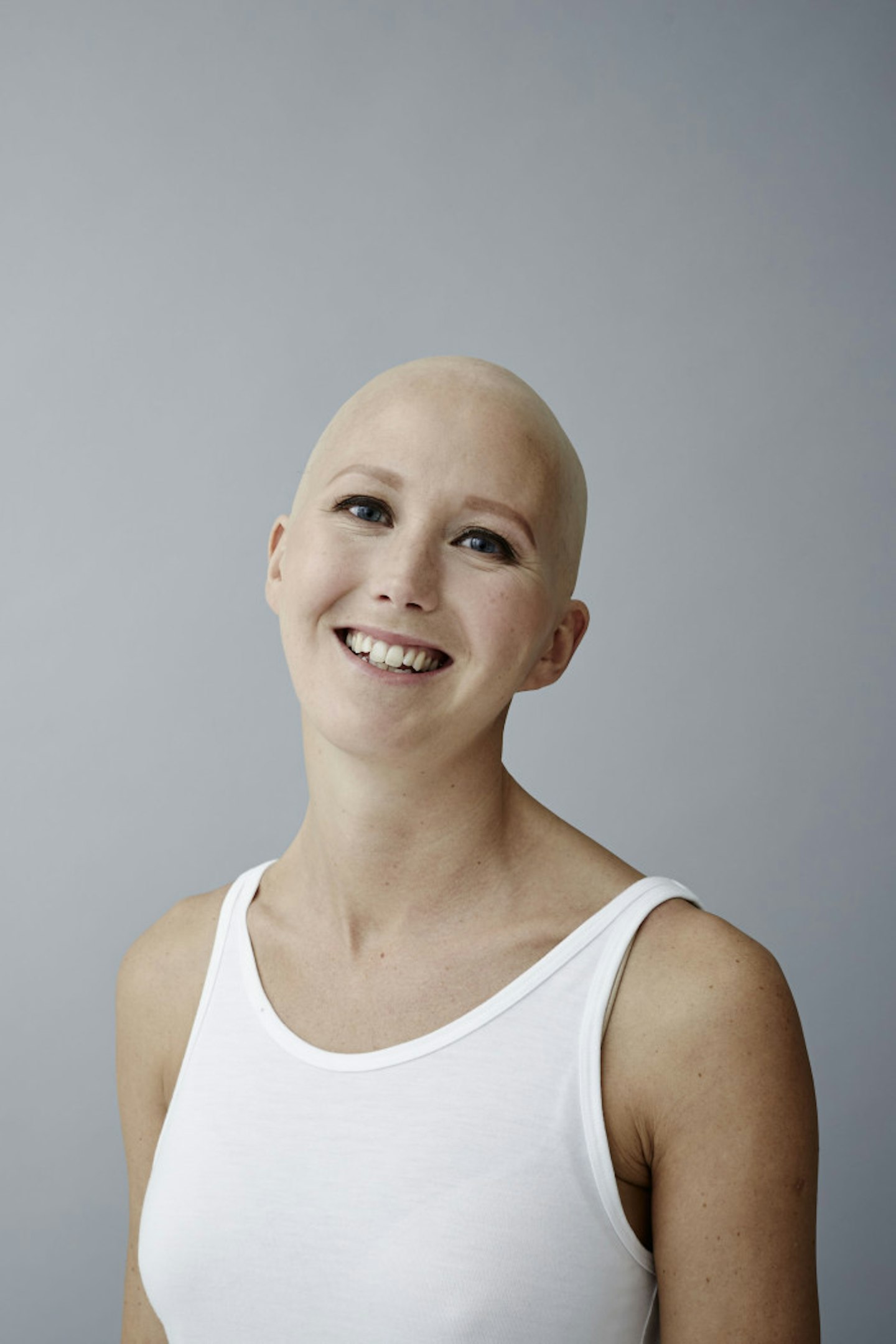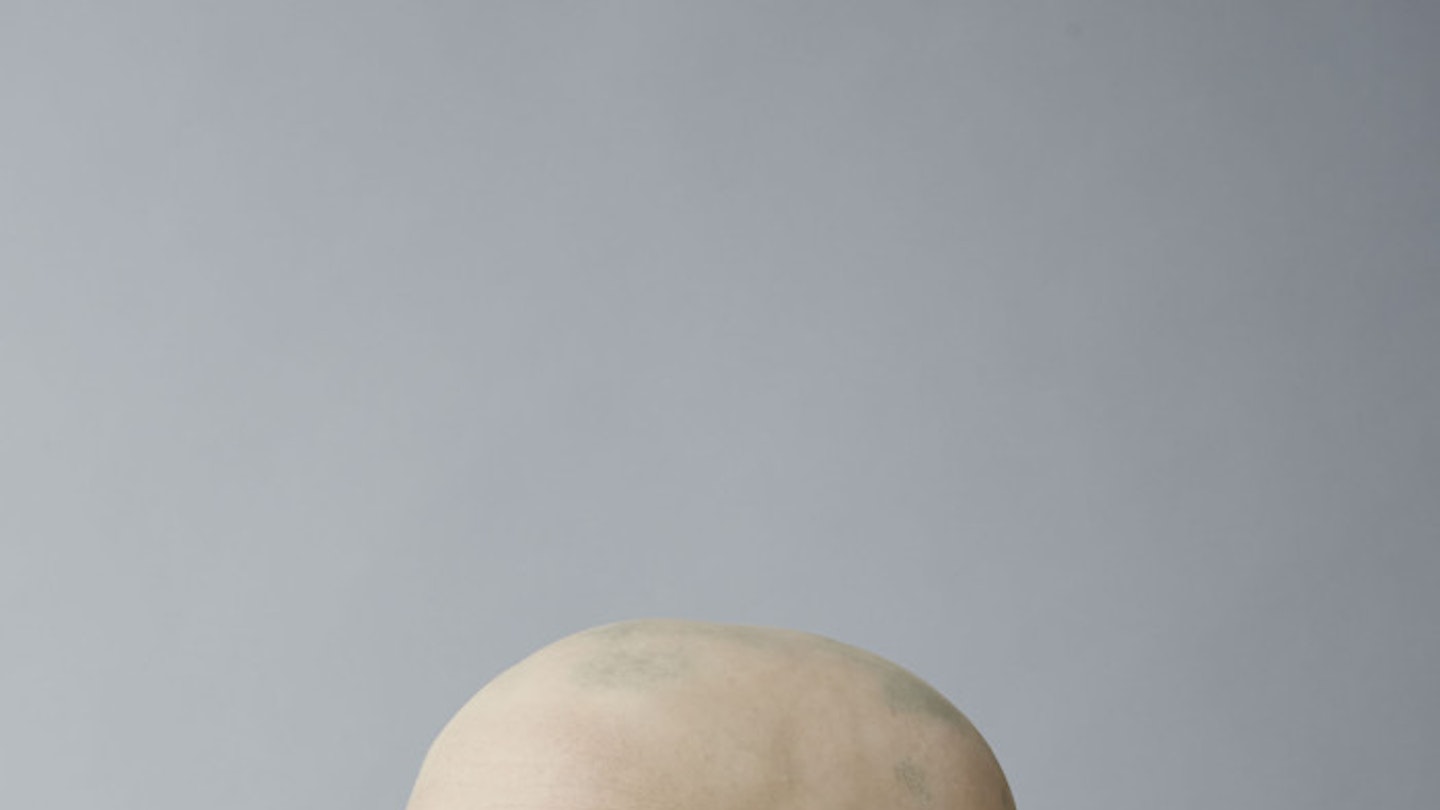One in five British women now suffer with hair loss. Nicole Mowbray asks what life is like without your ‘crowning glory’.
Few of us feel comfortable showing anyone but our closest friends and family the ‘real’ version of ourselves, but even that has been difficult for Ruth McPherson, 27, and 32-year-old Keremi Gawade. Both women have the autoimmune condition alopecia, which causes hair to fall out, in some cases permanently. These photographs are the first time most of their friends and family have ever seen them bald.
‘I feel like I’m celebrating what I truly look like for the first time in a decade,’ says Ruth, from Elgin, Scotland. ‘My wig’s been like a comfort blanket I’ve hidden behind for almost 10 years. Finally, I feel liberated. I don’t have to be ashamed of my baldness.’
‘I felt nervous going to the shoot as it meant baring my bald head to strangers and the camera,’ says Keremi, from London. ‘Since losing all my hair last year, I haven’t felt confident enough or really wanted to go without a head covering. Before this, the only time I’ve gone without a scarf was on a beach holiday this September. In a way, it felt easier to bare my head in front of complete strangers rather than friends. But owning my hair loss, rather than hiding it as I usually do, feels empowering.’

While waking up one morning to your hair falling out sounds like the stuff of nightmares, for a growing number of women, it’s a reality. An estimated eight million women in the UK – around 20% – suffer with hair loss according to recent research from trichologist Philip Kingsley. One in eight of those are under 35, and the causes range from hormonal problems, over-styling and crash dieting to medical conditions, vitamin deficiencies and stress.
Ruth was 18 when her hair loss started. ‘Large clumps in my hairbrush were the first thing I noticed,’ she says. ‘Within a couple of weeks, I’d wake up each morning to find a lot of my long, thick, dark hair on my pillow.’ Three months later, she was completely bald. That was 10 years ago and her hair’s never grown back. While Ruth doesn’t know what triggered it, she does know she has alopecia totalis – an autoimmune disease that attacks healthy hair follicles, often causing permanent hair loss. Although not damaging to physical health, as Ruth admits, alopecia can have a devastating emotional impact.
‘It started just after I’d left school and I did feel ashamed,’ she says. ‘I didn’t realise how important hair was until I lost it. As a woman in Western culture, there’s an expectation to have long, thick hair. Not having that made me feel very different.’
Ruth admits that wearing a wig affected her time at university. ‘I was quite guarded. I didn’t tell a lot of my male friends for a long time,’ she says. ‘Relationships were difficult too – I found it very hard to trust people would accept me. My first serious relationship wasn’t until I was 22. I kept back a lot of emotions and sometimes felt very alone and would cry for hours. I’ve been dating the same person for three years, so obviously he’s seen me without my wig, but I haven’t really been outside more than a handful of times without it on.’
Many women involved in the research described how hair loss caused them to withdraw from everyday activities. As many as 51% said they now shy away from having photos taken, and 47% avoid social events.
As yet, there is no cure for alopecia. But after relying on a series of high-quality wigs (she’s currently a long-haired brunette, but was peroxide blonde at university), Ruth got involved with a charity supporting those with the condition and recently participated in their fundraising Wig Free Week, to help raise funds for research.
‘I was nervous the first time I took public transport without my wig,’ she says. ‘But actually I realised people didn’t stare or even look! The photoshoot was another step on my journey to self- acceptance. Today’s society puts so much emphasis on looking “perfect” – it’s hard to go through life if you feel so different. I was very emotional the weekend before going wig-free and felt tearful. I think the crying comes from the feeling of “why me?” because alopecia can seem so random.’
It’s a feeling Keremi can identify with. She began losing her hair just over two years ago, shortly before her 30th birthday.‘I had very long brown hair, but when I looked in the mirror one day I found a couple of bald patches about the size of a 5p coin,’ she says. ‘When I noticed another a month later, I went to the doctor who diagnosed me with alopecia areata.’
It was treated with steroid injections that helped Keremi’s hair grow back over a period of six months. But by the summer of 2014, it began falling out again.
‘It was August and I was getting married in October. To my horror, by the wedding pretty much all my hair had fallen out. Every woman thinks of how they’ll have their hair on their wedding day – I’d imagined mine down with flowers in it. Instead, I had to ask a milliner to make me a turban. But on the day itself, my hair loss didn’t cross my mind – I was just on such a high, nothing could dampen it.’
By Christmas, Keremi was pregnant, and her condition had worsened. ‘I was so excited about the baby, but my alopecia had changed from patches to complete baldness. I lost all my eyelashes, my eyebrows and leg hair.’ While her husband and parents have been very supportive, Keremi admits coping with her condition has been difficult at times.
‘I do feel I’ve become less attractive,’ she says. ‘I know there are many worse conditions you can have, but it has been emotionally draining and psychologically scarring. I feel quite self-conscious and wonder if people look at me differently.’
While Keremi’s close friends know about her condition, she admits it’s hard meeting new people. ‘My old friends know how difficult I’ve found it,’ she says. ‘I haven’t necessarily told more recent friends about it as it’s a sensitive subject and I suppose it isn’t plainly obvious as I don’t go without a headscarf or turban. I still miss my hair and find it strange that new people are meeting a new version of me – I think of my appearance as “before alopecia” and “after alopecia’. By showing myself like this, my hope is that one day I might be brave enough to go out without a scarf.’
Ruth puts her new-found confidence down to the realisation she wasn’t the only sufferer. ‘While it’s frustrating when people moan about “a bad hair day”, talking to others has finally made me feel more confident in my own skin,’ she says. ‘My hope is that being seen without my hair becomes liberating, rather than terrifying.'
You can donate to Ruth's cause here and find out more about alopecia here.
